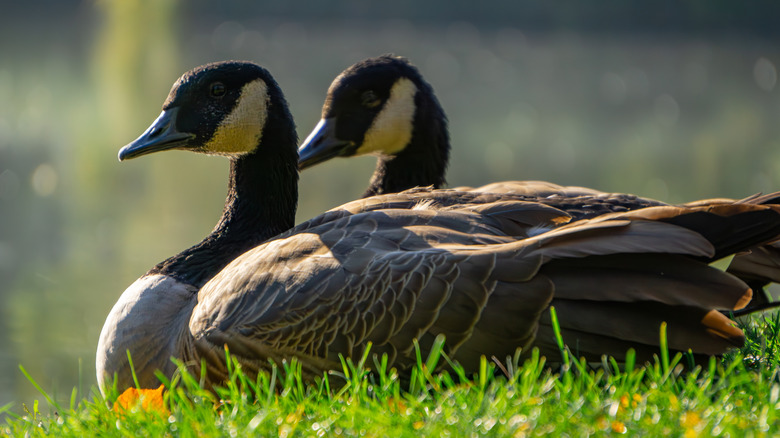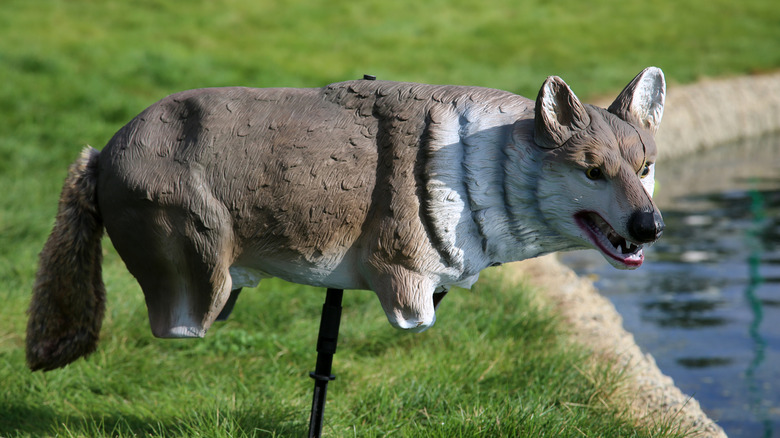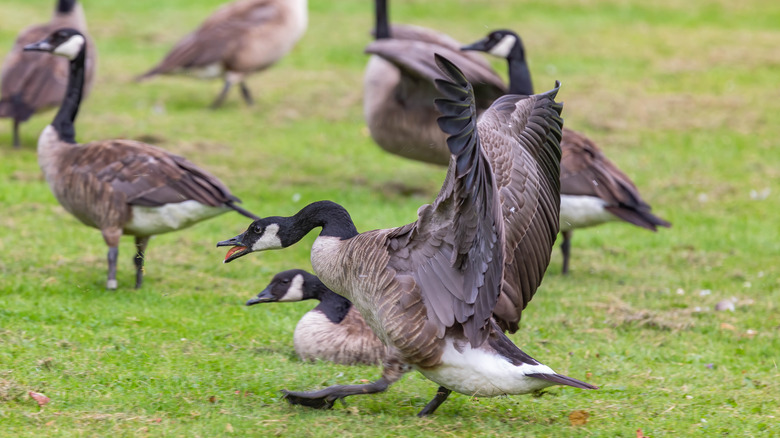How To Deal With Canada Geese Pooping On Your Lawn
We may receive a commission on purchases made from links.
Having local wildlife like Canada geese around can make your neighborhood more exciting because it's fun to watch them do their thing from a distance. However, wild animals like geese don't really understand boundaries, so having them nearby often comes with downsides like poop in your yard. If you're tired of leaving your house to their unwanted treasures, there are a few ways to keep geese from pooping on your lawn.
Before diving into how to stop geese from using your yard as a bathroom, you must know that Canada geese are federally protected in the United States. You cannot cause any harm to geese, their eggs, or their nests. If you're currently dealing with geese that are not just visitors but also actively nesting in your yard, then it's best to contact your local Fish and Wild Service or other wildlife control professionals to remove them. Killing or harming a Canada goose can land you with a $5,000 to $10,000 fine.
Thankfully, you can still use non-harmful tactics to scare geese away, like making your yard uncomfortable for them. That can be as easy as running out and clapping your hands whenever you see a goose around. But to make them less likely to pop up at all, one of the most important things to do is eliminate food sources. While Canada geese feed on grasses, they may also be attracted to your yard due to other food sources like bird feeders, pond vegetation, or trash. So, a good place to start is by ensuring that all trash bins are secure and removing your bird feeders for a month to see if the geese lose interest in your yard. Then, you can try placing them back to see if it only attracts the birds you like.
Other ways to keep geese out of your yard
A factor that makes Canada geese annoying is that they are habitual. If a goose nests somewhere one year, chances are high they will continue returning there. Although you cannot cause any harm to existing nests, you can make your yard less habitable by placing large, heavy objects like a rock in previous nesting spots. Geese may move on to other locations if they find that their preferred spot is no longer available.
If you have any ponds on your property, you also need to make those less welcoming to geese. A key thing to remember about geese is that they like wide, open areas so they can keep an eye out for predators. It also helps them with landing and take-off. You can easily make a pond less goose-friendly by planting shrubs or tall grasses around it. In addition, you can cover your pond with wire, place a 2 to 3 foot fence around it, or even use netting along your pond's bank, as this makes it difficult for geese to land. Plus, they don't like the feeling.
Another thing you can test out are coyote decoys because geese's natural predators include coyotes. Placing a decoy in a goose-heavy spot in your yard may be enough to frighten them away. For a suitable option, you can check out The Bird-X 3D Coyote Decoy on Amazon. Just make sure you move it around every so often to really mimic a predator. But keep in mind that using decoys may scare away other wildlife, too.
The joys of goose repellent
No matter what method you decide to test from above, you should combine it with goose repellent. You can search for commercially-made repellents or deterrents that are registered with the Environmental Protection Agency like Avian Migrate Goose Deterrent. It is made from non-toxic ingredients and you can snag a half gallon of it on Amazon.
However, it is easy to make your own repellent. For example, you can use common ingredients like garlic to keep pesky geese out of your yard. Try planting it in your garden, tossing a few heads in your pond, or even making a spray by mixing garlic, water, and adding other ingredients like cinnamon, onion, or chili peppers. Some people have found success with using grape Kool-aid to keep geese far away from your yard, too.
Once you've worked on scaring the geese off, you'll still need to deal with their actual poop. Part of what makes Canada goose poop so annoying isn't just that, well, it's poop on your lawn. Geese feces may contain bacteria like E. coli, salmonella, listeria, and more. It can also sometimes be a preferred snack for dogs. While they generally won't become ill from consuming small amounts, it's still gross. You can follow these tips for how to get rid of unsightly goose poop from your lawn, driveway, and other outdoor surfaces.


